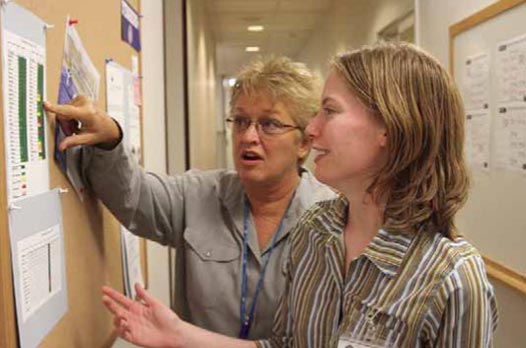Meeting Emerging Needs: Social Work
By Elizabeth Station
The Wall Street Journal ranked it as one of the best careers in 2006. Nationally, jobs in the field are expected to increase faster than average through 2014. People who do the work say it’s meaningful, varied, active, and satisfying.

Like every social work major, Sophia Del Fabro ’08 (right) must complete 480 hours of supervised training in a community setting before graduation. For her internship with the Visiting Nurses Association, she spends at least two days a week accompanying a professional social worker on home visits to chronically ill older adults. Here, she plans the day’s visits with supervisor Sue Meyers. “I like it,” Del Fabro says of the placement. “I think it’s helpful for making that transition from college to the world.”
Think we’re talking about a career in high finance, computer science, or film? Guess again. Social work is hot—and the Social Work Department at Saint Mary’s is preparing women to enter the profession with real advantages.
What do social workers do, exactly?
“We are not the people who are clerks handing out social welfare checks—and you can quote me on that,” says JoAnn M. Burke, associate professor of social work. “We’re working with enhancing social well being, and that takes many, many forms.”
“Social work is a people-centered field. But one look at the requirements for the major busts the myth that social workers are kind-hearted ‘do-gooders’ with little training or impact.”
Social workers provide the majority of mental health services offered in the United States. They provide family and individual therapy, serve populations from the aging to school-aged, advocate for policy change, and lead organizations. Counter to popular perceptions, three-quarters work in private agencies rather than the public sector.
Twelve Saint Mary’s women earned Bachelor of Arts degrees in social work in 2006. Recent grads travel many paths—helping families displaced by Hurricane Katrina in the South, representing abused and neglected children in juvenile court cases in Chicago, and working with immigrants on the U.S.-Mexico border.
When they leave Saint Mary’s, about 85 percent pursue a master’s degree in social work (MSW), giving the department the highest ratio on campus of students attending graduate school. Many receive scholarships and attend top-tier programs. Their training gives them a competitive (and salary) edge as they rise in the profession, Burke says. “Our students are in leadership positions … and that’s the strength of Saint Mary’s.”
Social work is a people-centered field. But one look at the requirements for the major busts the myth that social workers are kind-hearted “do-gooders” with little training or impact.
Students at Saint Mary’s take courses in human behavior, research methods, statistics, and policy. They study biology and psychology and often pursue second majors and minors in other disciplines. They are taught to approach problem solving from a “micro, mezzo, and macro” perspective—so they can make a difference to individuals, groups, and society.
Toughest of all, senior social work majors must complete a minimum 480-hour field placement that consists of a supervised internship in a community setting. This real-world experience is tied to a seminar that keeps them grounded in solid theory and practice.
Sophia Del Fabro ’07 transferred to Saint Mary’s from Bryn Mawr College for the social work major. She plans to attend medical school, but wanted to work with children and families before becoming a physician. Her field placement this fall is with the Visiting Nurses Association of Saint Joseph Regional Medical Center, accompanying a professional social worker who is a registered nurse on home visits to chronically ill older adults—for two full days each week.
How does she feel about her choice? “Social work is a very good background for going into medicine because, obviously, people skills are vital,” Del Fabro says. “You can learn the science in med school, but learning how to interact with people and really listen to them and understand where they’re coming from is really important.”
With three full-time faculty members and about 30 junior and senior majors, the social work department has a small but powerful presence on campus. It earned full accreditation in 2003, following a grueling evaluation by the national Council on Social Work Education (CSWE). That distinction means Saint Mary’s students can gain state licensing as practicing social workers. They also enter graduate school with advanced standing, and can complete the MSW degree in one year instead of two—saving time and money.
Saint Mary’s boasts six nationally accredited programs, which the Higher Learning Commission recently cited as “evidence of a commitment to academic and professional quality” at the College. Accreditation in social work measures how well the curriculum provides a knowledge base in eight major areas, including social work practice, research, social and economic justice, human behavior, diversity, ethics, and others. Having to meet those criteria improves the quality of the program, according to Director Frances Kominkiewicz, “because we are held up against a national standard…and we have accountability.”
Both she and Burke are professional social workers with Ph.D.s who bring experience and academic rigor to their teaching. Burke is a recognized expert in gerontology; Kominkiewicz focuses on children and families. They’ve worked to build connections with the South Bend community and create a diverse advisory board that includes health professionals, alumnae, and community leaders. They’re also connecting to international collaborators in China, Korea, and Germany.
What drives their efforts? Says Burke, “The charism of the Sisters of the Holy Cross is to meet emerging needs. That very much fits with what we’re about in social work.” Kominkiewicz’s answer is simple, but heartfelt: “I cannot imagine a better occupation, a better career.”

